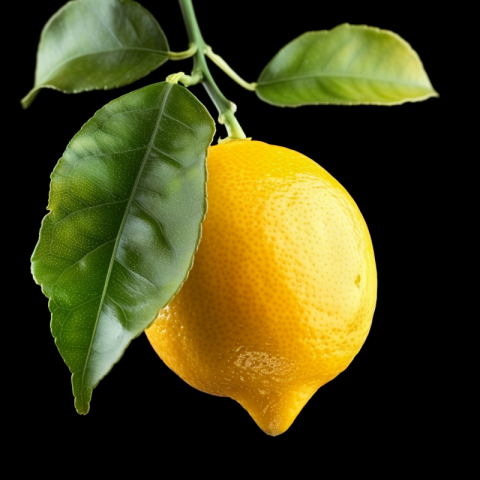











Lemon: A Burst of Citrus Sunshine - Culinary and Medicinal Marvel
The lemon, a bright yellow citrus fruit with a distinctive sour taste and refreshing aroma, is a culinary and medicinal powerhouse. Its versatility extends from flavoring dishes and beverages to serving as a natural cleaning agent and a source of essential nutrients. From its ancient origins in Asia to its widespread cultivation around the globe, the lemon has played a significant role in various cultures, cuisines, and traditional medicine practices.
1. The Origins of the Lemon: A Journey from Asia
The lemon's exact origin is uncertain, but it's believed to be native to Southeast Asia:
- It likely originated in a region encompassing Northeast India, Northern Myanmar, and parts of China.
- Lemons were cultivated in China and India for at least 2,500 years.
- They were introduced to the Middle East and the Mediterranean region by Arab traders around the 7th or 8th century CE.
- Lemons were brought to Europe during the Crusades and later to the Americas by Christopher Columbus in the late 15th century.
2. Botanical Characteristics: The Lemon Tree and Fruit
The lemon, Citrus limon, is a small evergreen tree belonging to the Rutaceae family:
- Lemon trees are typically thorny and can grow up to 20 feet tall.
- They have fragrant white flowers that develop into the lemon fruit.
- The lemon fruit is a modified berry known as a hesperidium.
- It has a bright yellow, textured rind (peel) that contains essential oils.
- The interior of the lemon is divided into segments filled with juicy pulp and seeds (though seedless varieties exist).
3. Nutritional Powerhouse: The Health Benefits of Lemon
Lemons are a good source of several important nutrients:
- Vitamin C: Lemons are renowned for their high vitamin C content, a powerful antioxidant that supports immune function, collagen production, and wound healing.
- Fiber: Lemons contain some dietary fiber, particularly in the pith and peel.
- Other Nutrients: Lemons also provide smaller amounts of potassium, folate, vitamin B6, and other beneficial plant compounds like flavonoids.
- Low in Calories: Making them a healthy addition to many meals.
4. Culinary Uses: A Versatile Ingredient
Lemons are incredibly versatile in the kitchen, adding brightness, acidity, and flavor to a wide range of dishes:
- Juice: Lemon juice is used in beverages (lemonade, cocktails), salad dressings, marinades, sauces, and desserts.
- Zest: The grated outer rind of the lemon, known as zest, is used to add a concentrated citrus flavor to dishes.
- Slices and Wedges: Lemon slices and wedges are used as a garnish for drinks, seafood, and other dishes.
- Preserved Lemons: A staple in Moroccan and other North African cuisines, preserved lemons are made by pickling lemons in salt and their own juice.
- Confectionery: Candied lemon peel is also popular.
5. Lemon in Beverages: From Lemonade to Cocktails
Lemons are a key ingredient in many beverages:
- Lemonade: A classic refreshing drink made with lemon juice, water, and sugar.
- Hot Lemon Water: Often consumed in the morning for its purported health benefits.
- Cocktails: Lemon juice is a common ingredient in many cocktails, such as the Margarita, Sidecar, and Whiskey Sour.
- Tea: A slice of lemon is often added to tea.
6. Lemon in Traditional Medicine: Ancient Remedies
Lemons have been used in traditional medicine for centuries:
- Vitamin C was used to prevent scurvy on long sea voyages.
- Lemon juice has been used as a remedy for sore throats, colds, and digestive issues.
- Some believe that lemons have detoxifying properties, although scientific evidence for this is limited.
7. Lemon Beyond the Kitchen: Other Uses
Lemons have a variety of uses beyond the culinary realm:
- Cleaning Agent: Lemon juice's acidity makes it an effective natural cleaner, useful for removing stains, disinfecting surfaces, and deodorizing.
- Beauty Products: Lemon is used in some skincare products for its astringent and brightening properties. However, direct application to skin can cause sensitivity and irritation.
- Aromatherapy: Lemon essential oil is used in aromatherapy for its uplifting and invigorating scent.
8. Growing Lemons: Cultivating Citrus Sunshine
Lemon trees can be grown in warm climates or in containers that can be brought indoors during colder months:
- They prefer well-drained soil and plenty of sunlight.
- Lemon trees require regular watering, especially during dry periods.
- They can be propagated from seeds, but it takes several years for a seed-grown tree to produce fruit. Grafting is quicker.
- Lemon trees are susceptible to certain pests and diseases.
9. The Future of Lemons
- Researchers are developing new lemon varieties that are more resistant to diseases and have improved flavor profiles.
- The demand for lemons continues to grow as consumers seek natural and healthy ingredients.
Conclusion:
The lemon, with its vibrant color, refreshing aroma, and tangy flavor, is a truly versatile fruit. From its culinary uses in both sweet and savory dishes to its applications in traditional medicine and household cleaning, the lemon has earned its place as a beloved and indispensable ingredient around the world. Its rich history, coupled with its nutritional benefits and diverse applications, ensures that the lemon will continue to brighten our lives and add a zesty spark to our kitchens for generations to come.
Lemon, lemons, lemon juice, lemon zest, lemon recipes, lemon benefits, lemon water, lemonade, lemon tree, growing lemons, types of lemons, Meyer lemon, Eureka lemon, Lisbon lemon, lemon nutrition, vitamin C, lemon essential oil, lemon cleaning, lemon in cooking, lemon desserts, lemon meringue pie, lemon bars, lemon cake, preserved lemons, lemon cocktails, lemonade recipe, health benefits of lemons, lemon detox, lemon origin, buy lemons online.

